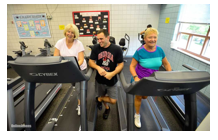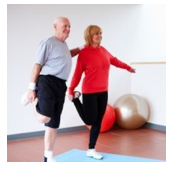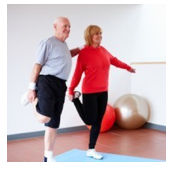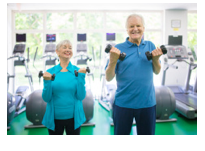SENIOR MOMENTS / Weight Loss for Seniors
Volume 1, Number 9
By Dean Walters
Senior Moments is dedicated to the issues we all face as we progress through our years.
Weight Loss for Seniors
For an overweight or obese senior, getting healthy improves your quality and length of life. Unfortunately, losing weight as a senior citizen can be difficult, particularly when dealing with unexpected aches and pains, dwindling energy and new nutrition needs. Still, you can fight off the weight gain that can naturally occur as you age with a two-pronged weight-loss plan that includes regular physical activity — both cardio and strength training — and a nutritious diet plan.
Basic Biology
It’s not your imagination — as the years have passed, your body has become softer and less muscular. From age 25 to age 75, body fat typically doubles, according to University of Rochester Medical Center, and your lean muscle mass decreases. This decrease in muscle mass means your body needs fewer calories to maintain your weight, but if you keep eating like you did as a younger adult, your weight will go up. If you plan to skip the gym and focus solely on controlling your food intake for your weight-loss efforts, think again. Obese seniors age 65 to 85 had the most weight-loss success when they both dieted and exercised, according to a study published in 2011 in “The New England Journal of Medicine.”
Get Moving
Senior citizens can’t hit the gym and run for hours like their younger counterparts — at least, not without serious risk of injury. Aim for 30 to 60 minutes a day of moderate-intensity physical activity, but start slowly if you haven’t been active in a few years. If 30 to 60 minutes seems like too much, break it into 10-minute increments. Choose low-impact activities such as walking and swimming to protect your aging joints. If one is in your area, join a class specifically designed for older adults. If you’re at a risk of falling, engage in balance training at least three days a week; potential activities include backward or sideways walking, toe walking or tai chi, advises the Centers for Disease Control and Prevention.
Work the Muscles
Incorporate a strength-training routine two to three times a week to help maintain the muscle mass that you naturally lose. After a five- to 10-minute warm-up to loosen the muscles, do body-weight exercises such as squatting over a chair, wall pushups and toe stands or calf raises. The CDC recommends two sets of 10 repetitions for each exercise. Once you feel stronger, move onto slightly more difficult exercises such as bicep curls and overhead presses with light weights, as well as hip abductions to target the lower body. Sit on a chair during upper-body exercises and hold onto the chair back during lower-body exercises for stability. End each strength session with stretches for all major muscle groups.
Delicious and Nutritious
Here’s a calorie reality check: if you take in just 100 calories per day (1 apple or 15 almonds) more than you burn, you will gain over 100 pounds in 10 years! Your caloric needs decrease as you age; therefore, for example, a woman over age 50 should cut back to between 1,600 and 2,000 calories a day, depending on her level of physical activity, according to the National Institute on Aging. If a lack of mobility is a hindrance to preparing healthy foods at home, don’t resort to calling for takeout. Instead, look into a grocery delivery service that allows you to place an order on the internet and have it delivered to your doorstep.
Eating enough food to keep up with the calories needed for movement is important, too — according to WebMD, seniors often grapple with preparing fresh, healthy foods at home due to difficulty chewing due to tooth pain or dentures, problems with indigestion and a declining sense of taste. Emotional problems such as depression or loneliness can play a role in both eating too little and eating too many of the wrong comfort foods. Visit a medical professional to determine a healthy diet for your physical and mental needs.
Dean Walters is a Board Certified Holistic Health Coach, a Certified Personal Trainer with specialties in Senior Fitness and Fitness Nutrition, and the owner of Living Boldly. 305-849-1474.
[livemarket market_name="KONK Life LiveMarket" limit=3 category=“” show_signup=0 show_more=0]









No Comment